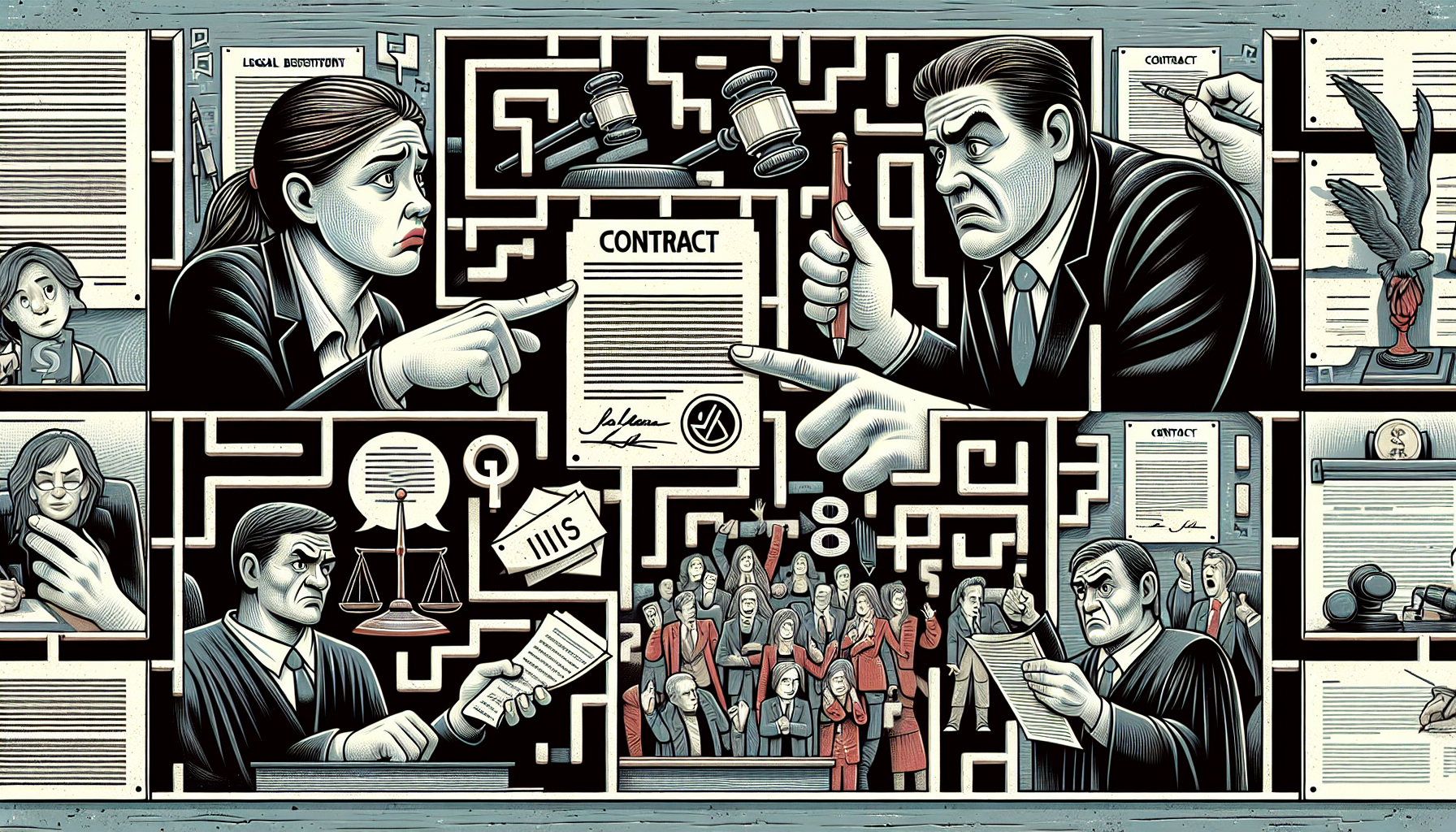Digital LawyerWed May 08 2024
Navigating Breach of Contract Cases: Strategies and Outcomes
What happens when a contract is broken, and what can you do about it? Breach of contract cases arise when obligations are not met, creating legal disputes and potential damages. This comprehensive guide will help you understand what constitutes a breach, examine its consequences, and discover the legal actions you can take to address it—all […]
What happens when a contract is broken, and what can you do about it? Breach of contract cases arise when obligations are not met, creating legal disputes and potential damages. This comprehensive guide will help you understand what constitutes a breach, examine its consequences, and discover the legal actions you can take to address it—all aimed at equipping you with the tools to handle or prevent these legal challenges.
Key Takeaways
A breach of contract occurs when a party fails to fulfill their obligations under the agreement, and identifying a valid contract involving agreement, intention, and consideration is critical before determining a breach.
Various types of breaches exist, including material, anticipatory, and minor breaches, each with distinct implications for legal action, and the impact of a breach must be assessed to decide on the appropriate remedy.
Legal remedies for breaches include monetary damages, equitable remedies such as specific performance and injunctions, and alternative dispute resolution methods like mediation and arbitration to settle disputes efficiently.
Recognizing a Breach of Contract

A breach of contract may manifest in various ways, ranging from an outright refusal to provide goods to more nuanced non-compliance with the stipulated terms. At its core, it occurs when one party fails to abide by the agreement’s conditions, often due to not meeting their responsibilities. Detecting indications of a breach is crucial for taking appropriate action. This includes recognizing unmet commitments or lapses in fulfilling duties. Before exploring the particulars of a breach, it is essential first to have a comprehensive grasp on what constitutes a valid contract — which forms the basis for such disputes.
Developing an understanding of the different categories of contractual breaches and learning how assess their impact are imperative steps. These elements will be Examined in forthcoming sections.
Identifying a Valid Contract
In essence, a contract is an agreement between two or more entities. Not every agreement rises to the level of a legally binding contract. A valid and enforceable legal contract comes into existence when three fundamental elements are present – this marks the point at which a contract occurs.
Agreement: This involves a clear offer and acceptance by the parties involved.
Intention: There must be mutual intention toward forming legal obligations.
Consideration: Value must be exchanged in some form—be it money, goods, services or even an abstention from acting.
It is these core components that make up a legally sound contract.
While contracts can exist in both oral and written forms—and are equally obligatory given they incorporate these essential elements—the proof of such agreements differs significantly between them. Illustrating the terms within a written document tends to simplify matters greatly compared to its verbal counterpart because it provides tangible evidence of all conditions agreed upon by parties concerned including legality capacity as well as consideration thus while pinpointing what constitutes as enforceable may appear simple on face value determining validity can necessitate rigorous evaluation often requiring specialized understanding within law circles.
Types of Breaches
Similarly to the variety of contracts that exist, breaches also come in different forms with distinct consequences and legal ramifications. In a material breach scenario, such as what unfolded in Farley v. Skinner, the agreement’s value is notably undermined due to one party failing to deliver critical information needed by another for property enjoyment. This type of severe violation permits the aggrieved party not only to end the contract but also to seek compensation through litigation because a material breach occurred.
Conversely, an anticipatory breach arises when it becomes evident that one member involved will fall short on fulfilling their commitments before they are scheduled to do so – giving rise immediately and legally protectable options for remedy or reparation. The case Hochster v De La Tour exemplifies this situation where an early claim was upheld by court judgments recognizing anticipatory contractual violations.
Lastly, are less significant infractions which may not result in direct cancellation of agreements. They can justify claims for damages, especially if they cumulatively amount up enough severity equivalent or close to those seen in full-fledged material infringements — all vital knowledge which could be crucially important when dealing with various instances where obligations outlined within contracts have been dishonored by any breaching entity involved.
Assessing the Impact of a Breach
The consequences for the innocent party in a breach of contract can vary widely, depending heavily on both the terms outlined within that contract and the exact nature of the failure to adhere to those terms. The essential goal following such an incident is to ensure that this non-breaching party is made whole again economically, essentially placed back into the position they would have been in had there never been any violation.
On another note, it’s intriguing to consider situations where breaching a contract might not result in detriment but instead could be beneficial. This concept known as Kaldor-Hicks Efficiency suggests certain conditions under which violating a contractual agreement may actually lead to more advantageous results for all involved parties and even potentially enhance societal welfare overall. Take, for example, if market prices suddenly surged, prompting a farmer who was contracted with a winery for grapes to choose instead not to fulfill their commitment. Surprisingly, this could end up being more lucrative collectively than sticking strictly by their initial agreement. Assessing breaches requires careful consideration of what specific circumstances are at play and how these events may unfold impactfully.
Legal Remedies for Breach of Contract

When a party defaults on their contractual obligations, it is crucial to comprehend the array of legal options at one’s disposal. These options range from pursuing monetary compensation and canceling the contract to seeking judicial mandates such as injunctions or orders for specific performance, all designed to safeguard the interests of the party not at fault. The selection and intensity of these remedial measures are closely tied to what kind of breach occurred – whether significant (material), anticipated before performance is due (anticipatory), or trivial.
Specifically talking about damages, they serve as a fundamental remedy in cases where there has been a violation of contractual terms, with an aim that financially places the aggrieved party back into the position projected if no default had ever happened. Nevertheless, circumstances arise wherein mere financial reparations do not fully redress incurred losses. It’s within this context that equitable remedies shine along with alternative dispute resolution techniques—avenues we will delve into in more depth moving forward.
Monetary Damages
Financial compensation is the prevalent recourse for a breach of contract, intended to reimburse the non-breaching party for economic losses sustained due to the breach. The central aim in awarding damages in cases involving contract breaches is to restore the aggrieved party financially as though there had been no breach at all.
There are various categories of damages, such as nominal damages that offer token acknowledgment of a breach without an actual monetary loss and substantial damages given when there’s measurable financial harm caused by the breaching party. Both the nature and magnitude of these compensations hinge on particular details surrounding each instance of contractual violation and how severe the consequent financial damage has been.
Equitable Remedies
In breach of contract situations, financial compensation may not always suffice to rectify the loss incurred. As a result, equitable remedies are employed as legal resolutions that courts can dispense when monetary damages fall short. Equitable remedies encompass measures like specific performance and injunctions.
When it comes to compelling adherence to contractual terms, particularly concerning distinctive goods or circumstances where other types of reparation would prove inadequate, courts often mandate specific performance. In contrast, injunctions serve as court-mandated orders either restraining a party from executing particular acts or obligating them to take action. In contract cases involving breaches where mere financial compensation is insufficient for redress, equitable remedies become crucial by offering solutions that more accurately remedy the harm resulting from such breaches.
Alternative Dispute Resolution
Given the potential drawbacks of lengthy, expensive, and tension-filled court cases, a significant number of companies turn to Alternative Dispute Resolution (ADR) as their go-to for settling disagreements. ADR strategies such as mediation and arbitration provide a more expedient and economical solution compared to traditional litigation.
In the case of mediation, parties engage with an impartial third party—the mediator—who helps them negotiate a settlement without making any formal judgment. Conversely, arbitration resembles an informal courtroom setting where after reviewing all presented evidence and arguments from both sides, the arbitrator hands down an enforceable verdict. Regardless of which route is taken within ADR mechanisms, these approaches offer practical means for effectively addressing breach of contract disputes while promoting harmony between disputing parties.
Building a Strong Contract Claim

Creating a robust contract claim is essential in the event of a breach to ensure you receive appropriate compensation or remedies. The process includes compiling evidence, confirming there’s an actual contract, and demonstrating that this contract was violated. Documented exchanges like letters, faxes or emails can be key as they often contain information pertaining to how the contract was formed or specifics about behaviors violating its terms.
Forming a powerful case around your contract claim takes more than just showing that there was indeed a contractual agreement which has been breached. In such cases, consulting with experts may prove extremely beneficial. We will explore what it entails to validate the existence of a binding agreement, identify instances of its infringement and highlight why professional legal counsel plays an important role in these situations.
Proving the Existence of a Contract
To build a persuasive breach of contract claim, it’s necessary to verify the existence of the actual contract. This means evidencing several key components:
an initial offer
acceptance of said offer
mutual consideration
and a shared intention to establish legal obligations.
Typically, evidence for a written contract comes in the form of documents bearing signatures from all involved parties or, depending on certain types of contracts’ legal requirements, satisfying statutory formalities.
Should there be no written proof available, oral accounts can suffice in proving that a contract existed. This is contingent upon how believable those accounts are to the adjudicating judge. Providing distinct and precise terms which correspond with relevant occurrences reinforces verification efforts concerning any alleged agreement—making such validation integral when pursuing a robust case for breach of contractual agreements.
Establishing a Breach
In determining the presence of a contract breach, it is crucial to demonstrate that a party has failed in meeting their contractual obligations. This failure can manifest in various forms, including inadequate workmanship, neglecting to perform agreed-upon duties, delays in payment schedules, or not providing goods or services according to stipulated terms.
Merely identifying failures by the other party isn’t sufficient for establishing a breach. One must also prove that these failings resulted in loss for the non-breaching party. To substantiate this claim, often necessitates the gathering and presentation of supporting evidence such as documentation, exchanges of communication or testimonials from witnesses. Proving contract breaches lies at the heart of building a strong case for any contract claim against the breaching party.
Seeking Legal Advice
It is possible to manage breach of contract cases on one’s own, yet the complexities and legal technicalities involved may be overwhelming. To settle disputes over breaches of contract swiftly and obtain positive outcomes without extended court proceedings, seeking legal counsel is often essential.
Enter companies such as Gaffney Zoppi. They provide dedicated services from experienced contract lawyers with quick response times and competitive, fixed-rate pricing structures – offering an economical legal option for enterprises. Thus, when aiming to construct a robust contract claim or steer through intricate contractual disagreements, the value of professional legal guidance cannot be overstated.
Avoiding Breach of Contract Disputes

Comprehending the nuances of breach of contract cases and mastering their navigation is crucial. It’s always more advantageous to prevent such occurrences. To circumvent disputes related to breaches of contracts, one can employ several tactics: crafting explicit agreements, incorporating clauses that address dispute resolution within those agreements, and seeking guidance from an attorney specializing in contract law.
These methods will be explored more thoroughly in the following sections.
Drafting Clear Contracts
The first step towards avoiding breach of contract disputes is drafting clear contracts. Contracts should lay out rights and obligations explicitly, protecting business interests and forming a strong basis for enforcement in breach scenarios.
Thorough negotiations before finalizing a contract ensure clear and definitive terms and conditions, circumventing ambiguities and setting explicit mutual expectations. Contract lawyers, like those at Gaffney Zoppi, can be instrumental in drafting flexible contracts that can evolve with circumstances and guide parties through contractual adjustments as required.
Negotiating Dispute Resolution Clauses
To circumvent disputes related to breaches of contract, it is critical to include clauses for negotiated dispute resolution within the contractual provisions. These particular clauses delineate a pre-agreed method by which any conflicts or issues that arise throughout the duration of the contract can be resolved.
Include these negotiated dispute resolution clauses in contracts ensures:
Defined methods for managing disagreements outside court proceedings
Stability and foreseeability in conflict management
The flexibility for involved parties to resolve disputes tailored to their specific requirements.
Working with a Contract Lawyer
Consulting a contract attorney is a critical step in preventing disputes arising from breaches of contract. Law firms such as Gaffney Zoppi boast attorneys with specialized knowledge who can offer invaluable guidance on the creation, negotiation, and resolution of contracts. It’s prudent to consult legal professionals for advice to secure an optimal outcome.
When engaging with Gaffney Zoppi lawyers, clients enjoy numerous advantages.
The firm dedicates time to thoroughly comprehend each client’s business ambitions and challenges which allows them to tailor contracts that meet unique needs.
They are committed to delivering results swiftly.
Their pricing structure is both competitive and transparent, offering fixed rates for their services.
Securing the expertise of a Gaffney Zoppi contract lawyer represents a strategic investment toward averting potential breaches of contract disputes.
Real-Life Breach of Contract Cases

Let’s examine some real-life examples of contract cases that involve an actual breach. By exploring instances of material, anticipatory, and minor breaches, we gain practical understanding into the nature of these violations and the types of legal recourse sought in such events.
Material Breach Example
In a particular instance, there was a material breach when Company A did not fulfill its obligation to supply Company B with a specially ordered piece of machinery. Due to this noncompliance, Company B missed out on an important contract and consequently pursued compensation for their losses.
Similarly, in another scenario, the other party—a software vendor—failed to deliver promised updates and support as stipulated by their agreement. This resulted in interruptions within the client’s business activities and ultimately led them to win a court case that awarded consequential damages stemming from the breach.
Anticipatory Breach Example
An instance of anticipatory breach occurred when a contractor informed the client ahead of time that they would be unable to fulfill their obligation to finish a construction job by the agreed deadline. Consequently, this enabled the client not only to hire an alternative contractor but also to initiate legal action for recovery of any additional expenses incurred.
In a separate notable case involving an anticipatory breach, before fulfilling their contractual obligations at an event, a well-known personality publicly declared their intention not to perform as agreed upon. This led them and the aggrieved party into an agreement which compensated for anticipated losses in ticket revenue and damages related to reputational harm due to party failures. The individual or entity pursuing reparation for such preemptive contract violation successfully obtained what was sought after.
Minor Breach Example
Regarding a minor infraction, an instance involved the tardy delivery of goods that negligibly impacted the business operations of the recipient, leading to a modest compensation for insignificant damages. Herein, the entity on the receiving end is deemed an innocent party. Similarly, another slight breach comprised improper packaging which bore no effect on product integrity. Resolution was achieved via reductions in forthcoming purchases rather than pursuing litigation.
These instances underscore that reactions to contractual violations should correspond with their gravity and resultant damage inflicted.
Summary
Delving into the complexities of breach of contract cases can seem overwhelming, but a thorough grasp on contractual principles, varieties of breaches, lawful remedies and preventive strategies for dispute avoidance simplifies the process. This blog entry has served as an exhaustive instructional resource for mastering how to handle breach of contract situations.
In summation, comprehension of your rights and duties within contract law is imperative whether you are an entrepreneur, business proprietor or someone involved in contractual agreements. Keep in mind that sidestepping future issues with contracts is preferable to rectifying them later on. It’s wise to devote effort to crafting transparent contracts, include clauses tailored towards dispute resolution, and perhaps engage with a legal expert specializing in contracts like Gaffney Zoppi for steering clear of possible conflicts ahead.
Frequently Asked Questions
What is a breach of contract?
When one party does not meet their obligations stipulated in the agreement, a breach of contract occurs.
What are the types of breaches in a contract?
When assessing a breach of contract, it is crucial to recognize the key classifications which include material breach, anticipatory breach, and minor breach. These categories serve as the foundational types of breaches in contractual agreements.
What are the legal remedies for a breach of contract?
Should there be a violation of the contractual agreement, legal recourse is available which can include compensation for damages, cancellation of the contract, and obtaining particular judicial directives such as specific performance or injunctions.
This range of remedies offers practical solutions to handle the infringement satisfactorily.
How can breach of contract disputes be avoided?
To prevent disputes arising from contract breaches, concentrate on composing unambiguous agreements, negotiating clauses related to dispute resolution effectively, and consulting with a contract attorney for comprehensive advice and clarity.
What services does Gaffney Zoppi provide?
Zoppi Gaffney provides expert legal advice through their specialized contract lawyer services, catering to an extensive clientele that includes private individuals, entrepreneurs, and business owners. Their expertise spans across multiple legal requirements from the realm of business agreements to the intricacies involved with private equity firms.
Malcolm Zoppi is a specialist corporate solicitor of England and Wales (SRA: 838474) and Managing Director of Zoppi & Co, a boutique corporate and commercial law firm serving UK SMEs since 2020. With qualifications including LLB (Hons), LPC, and MSc, Malcolm has successfully guided over 300 clients through complex M&As, equity fundraisers, and commercial transactions, with clients rating his services as “excellent”.